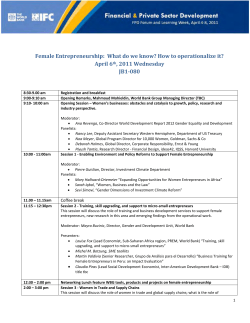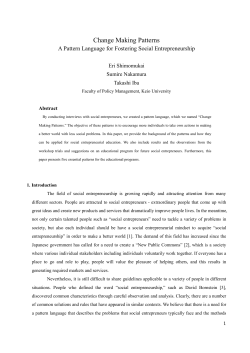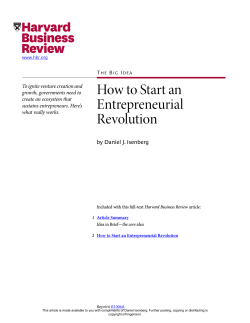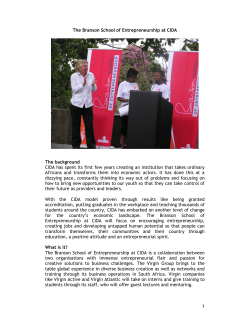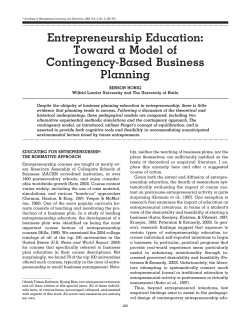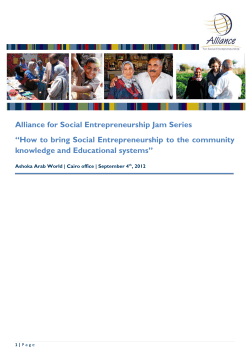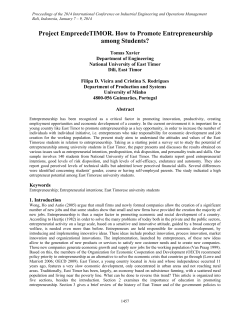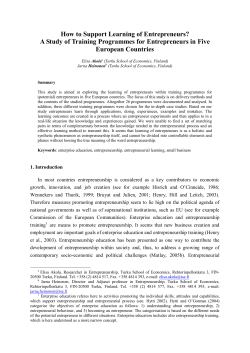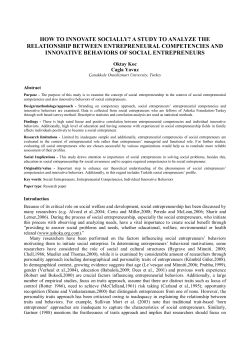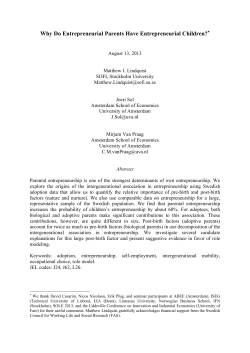
How to build an enabling environment for youth entrepreneurship and sustainable
How to build an enabling environment for youth entrepreneurship and sustainable enterprises Paper for the knowledge sharing event on Integrated Youth Employment Strategies, Moscow 17‐19 February, 2010 Martin Clemensson Jens Dyring Christensen Small Enterprise Programme, International Labour Office, Geneva February 2010 The world is in transition searching for more innovative ways to combine economic growth, the reduction of poverty and equitable development in a more environmentally sustainable manner. There is a mounting concern in all corners of the world about both the short and long term impact of globalization on the environment and a dawning realisation that ensuring the quality of present and future life and employment depend on how well we tackle this challenge. This calls for new forms of cooperation between governments, business, workers and societies in general to promote the concept of “sustainable enterprise”. This concept, as endorsed by the International Labour Conference (ILC) in 2007, recognises the importance of integrating three pillars of sustainable development: economic, social and environmental. The ILC’s conclusions highlight the importance of an “enabling environment” for sustainable enterprises.1 This term as presented in this essay contains four elements such as i) the norms and values in a country with regards to entrepreneurship, ii) the policy, legal and regulatory framework in which youth led enterprises operate, iii) the administrative arrangements used to implement and enforce this framework, and iv) the organisations that promote, regulate and represent enterprises and their workers, including financial institutions. To put it short, we are facing three grave challenges at the moment that make the promotion of enabling national environments for sustainable youth enterprise very urgent. First, the global economic crisis is already taking its toll on developed, emerging and developing economies. This brings with it unprecedented labour market and social challenges across advanced, emerging and developing countries, including for young women and men that are already in the labour market or for those that are about to make the transition from school to a working career. Second, the planet itself is facing a “sustainability” crisis. Current production, consumption and work patterns consume energy and other resources and leaves behind waste and greenhouse gases at a rate dangerous for our planet and our health. Climate Change itself, adaptation to it and efforts to stop it harbour major risks, but they also provide new and innovative opportunities for youth entrepreneurship and youth employment creation across the world. Third, the world is facing a grave employment crisis for young people. There are more than 1 billion young people aged 15-242 in the world today, of which 85 per cent live in developing economies and almost 100 million young people will be entering the global workforce every year for the next ten years. The global youth workforce today numbers 1 International Labour Conference (2007) Conclusions Concerning the Promotion of Sustainable Enterprises, June, Paragraph 11. 2 The definition of youth may vary from country to country. The standard UN definition comprises the age group between fifteen and twenty-four inclusively. 2 more than 600 million and the number of unemployed youth has increased to about 80 million. Given the current economic downturn this number is likely to rise even further.3. Why youth entrepreneurship? Evidence shows that when jobs are scarce, especially young persons are generally more likely to be unemployed. In the current economic crisis young people are the first to be laid off (last-in first-out). This had lead to millions of laid off young workers returning to rural areas where the prospects for securing alternative work are dire. Compared to adults, the youth of today are almost three times as likely to be unemployed and globally one in five working youth continues to live in extreme poverty on 1US$/day level.4 Many young people are therefore simply pushed into self-employment becoming “entrepreneurs by necessity” rather than “entrepreneurs by choice”. Many struggle in the informal economy with few acquired entrepreneurial skills, little, if any, knowledge about what it takes to run a business and with little or no access to affordable finance or business development services. The promotion of more effective youth entrepreneurship policies and strategies is therefore getting increased attention among governments and international organisations and there is a growing recognition that responsible youth entrepreneurship must be at the heart of tackling global environmental, economic and employment challenges. The ILO has a clear and unique mandate to improve the business environment for sustainable enterprise5. Enterprises are the principal source of economic growth and employment creation and are at the heart of economic activity and development in nearly all countries. Business owners, managers and workers combine their skills and resources to produce enterprises that are able to compete effectively in local, national and international markets. It is within this context that the ILO’s primary goal of promoting “opportunities for women and men to obtain decent and productive work, in conditions of freedom, equity, security and human dignity” is recognised.6 Youth entrepreneurship falls within this global mandate and is a strategic component of the ILO’s Youth Employment Programme (YEP) as well as of the global Youth Employment Network (YEN) in which the World Bank, UNDP and the ILO are partnering with governments across the world. Do we know what works? Entrepreneurship itself is a young area of research and youth entrepreneurship is even younger. Much of the research literature is of high-income or middle-income countries and there is a lack of empirical evidence from developing economies, largely also due to unavailable data. However, general academic research as well as concrete and practical 3 Global Employment Trends , International Labour Organization, Geneva, March 2009 Global Employment Trends for Youth, International Labour Organization, Geneva October 2008. 5 ILO Declaration on Social Justice for a Fair Globalisation, ILC 2008; ILO Declaration on Fundamental Principles and Rights at Work, ILC 1998; Conclusions Concerning the Promotion of Sustainable Enterprises, ILC 2007; Recommendation No.189 of 1998 on the General Conditions to Stimulate Job Creation in Small and Medium-Sized Enterprises; Recommendation No.193 of 2002 on the Promotion of Cooperatives; 6 Decent Work; the report of the Director-General of the ILO to the International Labour Conference, June 1999. 4 3 experiences gained by the ILO over the past 10 years has identified various constraints and barriers to youth entrepreneurship. Typical challenges are lack of an enterprise culture in many countries; unfavourable legal, policy and regulatory frameworks for youth entrepreneurship; the lack of entrepreneurship education across formal and informal educational systems; the lack of access to affordable financing in the form of start-up, investment or working capital, and; little knowledge about and access to relevant business development services and support schemes for youth already in business or for those or interested in pursuing an entrepreneurial career.7 What are the policy implications? For youth entrepreneurship policies to be effective it should be approached within the context of wider employment policies and programmes and an integrated approach with interventions across multiple sectors and at multiple levels must be taken Interventions should therefore target the specific challenges that youth face with regards to: i. The promotion of entrepreneurship culture – social and cultural attitudes along with family values and norms have a strong influence on whether a young person decides to pursue an entrepreneurial career. Whereas society’s norms influence an individual’s approach to life they similarly influence entrepreneurial activity. Entrepreneurship culture campaigns, the promotion of young successful entrepreneurs as role models, business idea competitions, awards, media coverage, youth business events and entrepreneurship education are important strategies for creating a culture of entrepreneurship. ii. Introduce entrepreneurship education at different education levels – presenting students to the world of business and transferring knowledge and entrepreneurial skills through formal and informal education is crucial to create responsible young entrepreneurs, including social entrepreneurs. Entrepreneurship education is not only a means to create young entrepreneurs but also to equip young people with entrepreneurial attitude and skills which will benefit them in other areas of life, their communities and society as a whole. iii. Improvement of the legal and regulatory environment - with emphasis on the specific barriers and burdens faced by young entrepreneurs - and especially young women entrepreneurs is especially important.8 Often the administrative and regulatory burdens – such as business registration, the time it takes to register, the cost, the number of steps/procedures, minimum capital requirements, property rights 7 Schoof 2006 ; Nafukho 1998 ; Nasser 2003 ; Weeratunge 2007 ; Blokker and Dallago 2008 ; Greene 2005, Blanchflower and Oswald 1999, Llisterri et al. 2006; Owualah 1999; James-Wilson and Hall 2006; Haftendorn, and Salzano 2003/4 ; Audretsch 2002. 8 For instance, lack of right to own land (collateral) and property in some countries, to open a bank account, register a business etc. Complex, costly and lengthy business registration procedures affect potential women entrepreneurs more. Evidence shows that countries with a more enabling business environment have a larger share of women entrepreneurs. This has spill over effects such as better education and health for children leading also to healthier and better educated future generations. 4 etc. - have a disproportionally negative impact on youth-owned businesses, which are more likely to remain informal as a result. Business environment reforms are necessary to unleash the entrepreneurial efforts of current and emerging young businesswomen and men. iv. Access to affordable finance – is often perceived as one of the biggest impediments for younger people who, compared to older age groups, have no or less savings and resources, lack of securities in form of e.g. land and property that can be used as collateral in debt-financing, lack of business experience etc. Easing the collateral and legal requirements on young entrepreneurs is important and improving access to various types of finance micro, equity, venture and credit guarantee schemes – in some countries backed by governments – are important factors in improving the access to finance for young entrepreneurs. v. Relevant business development services and support schemes - for youth already in business or for those interested in pursuing an entrepreneurial career is important. Through the pre- start-up, start-up and growth phases of a business venture, there is a need for specific training in entrepreneurial and business management skills. Potential young entrepreneurs often lack business connections, have little or no knowledge about where to access business support services and often not adequate workspace and business infrastructure. Addressing these constraints through e.g. “one-stop” shops, youth enterprise centres, business incubators and entrepreneurship and start-up training is increasingly being experimented with in several countries. An example of an integrated programme and intervention mix is illustrated below: Examples of Youth Entrepreneurship Policy & Programme Mix Enterprise culture, values and norms (meta level) Macro level Meso level Micro level National Youth Policies and Action Plans Entrepreneurship education for in-school youth Youth Business climate surveys and business regulatory reforms Business start-up & improvement programmes Stimulating demand for entrepreneurship among young peoples Promotion of successful young entrepreneurs as role models Women’s entrepreneurship Market diagnostics and sector analysis Entrepreneurship culture campaigns Establishment of finance schemes Business idea competitions for young entrepreneurs Establishment of youth funds to finance innovative projects 5 Provide information on access to business support services Support to young entrepreneur associations and cooperatives Facilitating business linkages and access to mentorships To have a lasting impact, the promotion of youth entrepreneurship should be approached comprehensively, emphasizing sectors with job creation potential and integrating the three components of sustainable enterprises – social, economic and environmental. Human progress and sustainable economic development depend on new ideas and the ability of young and future entrepreneurs to implement these ideas. The only means to bring about sustainable development is through investments in the creativity, innovation and problem solving skills of youth. *** 6 References Audretsch D. (2002) ‘Entrepreneurship: A Survey of the Literature’, Published by the European Commission, Enterprise Directorate General, July 2002 Blokker, P., Dallago, B. (2008): Youth Entrepreneurship and Local Development in Central and Eastern Europe, Aldershot: Ashgate, 2008 Curtain (2000): Towards a Youth Employment Strategy, Report to the United Nations on Youth Employment, 20 August 2000 Dyring Christensen, J. & Goedhuys, M. (2004) Impact of National Policy and Legal Environments on Employment Growth and Investment in Micro and Small Enterprises, Small Enterprise Programme, working paper No. 63 Dyring Christensen, J. & Simpson, J. (2009) Youth Entrepreneurship and the ILO, Note on practices and lessons learned, Small Enterprise Programme, International Labour Office, Geneva Erkko, Autio (2005) Global Entrepreneurship Monitor, 2005 Report on High Expectation Entrepreneurship, Erkko, Autio (2007) Global Entrepreneurship Monitor, 2007 Global Report on High Growth reneurship, Greene, F.J. (2005): Youth Entrepreneurship: Latent entrepreneurship, Market Failure and Enterprise Support, Centre for Small and Medium-Sized Enterprises, University of Warwick, Working Paper No. 87, June 2005 Hayton, J.C., et al. (2002): “National culture and entrepreneurship: A review of behavioural research”, in Entrepreneurship Theory and Practice, 2002, Vol. 26, No. 4, pp. 33-52. ILO, Conclusions Concerning the Promotion of Sustainable Enterprises, International Labour Conference, 96th session, Geneva2007 ILO, Global Employment Trends for Youth, International Labour Office, Geneva 2008 ILO Global Employment Trends , International Labour Organization, Geneva, March 2009 ILO, The Financial and economic crisis: A Decent Work Response, Governing Body paper, GB.304/ESP/2, International Labour Organization, Geneva, March 2009. James-Wilson, D., Hall, J. (2006): Microfinance, youth and conflict West Bank case study, Washington D.C: Poverty Frontiers, 2006 Llisterri, J.J., Kantis, H., Angelelli, P.; Tejerina, L. (2006): Is Youth Entrepreneurship a Necessity or an Opportunity? A First Exploration of Household and New Enterprise Surveys in Latin America. Washington, D. C: Inter-American Development Bank. Technical Papers Series. May, 2006 Nafukho, F.M. (1998): Entrepreneurial skills development programs for unemployed youth in Africa: A second look, Journal of Small Business Management Milwaukee: Jan 1998. Vol. 36, Iss. 1; p. 100 (4 pages) Nasser, M. E. (2003): Flight of the young flamingos: alternative futures for young entrepreneurs in South Africa Owualah, S.I. (1999): Tackling Youth Unemployment Through Entrepreneurship [Journal Article] International Small Business Journal, London: Apr-Jun 1999. Vol. 17, Iss. 3; p. 49 (11 pages) Schoof, U. (2006): Stimulating Youth Entrepreneurship: Barriers and incentives to enterprise start-ups by young people, ILO, SEED Working Paper No. 76 Weeratunge, N. (2007): Enhancing the enterprise culture of Sri Lanka: Results of the ILO Enter-Growth Project's Cultural Assessment in Four Districts, ILO Colombo 7
© Copyright 2025
